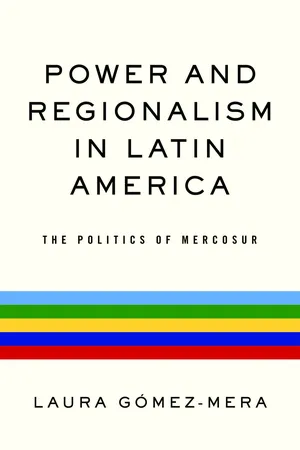
Kellogg Institute Series on Democracy and Development
The Politics of MERCOSUR
- 304 pages
- English
- PDF
- Available on iOS & Android
About This Book
In Power and Regionalism in Latin America: The Politics of MERCOSUR, Laura Gómez-Mera examines the erratic patterns of regional economic cooperation in the Southern Common Market (MERCOSUR), a political-economic agreement among Argentina, Brazil, Paraguay, Uruguay, and, recently, Venezuela that comprises the world's fourth-largest regional trade bloc. Despite a promising start in the early 1990s, MERCOSUR has had a tumultuous and conflict-ridden history. Yet it has survived, expanding in membership and institutional scope. What explains its survival, given a seemingly contradictory mix of conflict and cooperation?
Through detailed empirical analyses of several key trade disputes between the bloc's two main partners, Argentina and Brazil, Gómez-Mera proposes an explanation that emphasizes the tension between and interplay of two sets of factors: power asymmetries within and beyond the region, and domestic-level politics. Member states share a common interest in preserving MERCOSUR as a vehicle for increasing the region's leverage in external negotiations. Gómez-Mera argues that while external vulnerability and overlapping power asymmetries have provided strong and consistent incentives for regional cooperation in the Southern Cone, the impact of these systemic forces on regional outcomes also has been crucially mediated by domestic political dynamics in the bloc's two main partners, Argentina and Brazil. Contrary to conventional wisdom, however, the unequal distribution of power within the bloc has had a positive effect on the sustainability of cooperation. Despite Brazil's reluctance to adopt a more active leadership role in the process of integration, its offensive strategic interests in the region have contributed to the durability of institutionalized collaboration. However, as Gómez-Mera demonstrates, the tension between Brazil's global and regional power aspirations has also added significantly to the bloc's ineffectiveness.
Frequently asked questions
Information
Table of contents
- Cover
- Series Page
- Title Page
- Copyright
- Dedication
- Contents
- List of Tables
- List of Figures
- List of Abbreviations
- Acknowledgments
- Chapter One: Introduction
- Chapter Two: Patterns of Conflict and Cooperation in the Southern Cone
- Chapter Three: Systemic Incentives, Domestic Constraints, and Regional Cooperation
- Chapter Four: The Automobile Sector Crisis
- Chapter Five: The Footwear Industry Dispute
- Chapter Six: Failure to Relaunch
- Chapter Seven: A Narrow Escape
- Chapter Eight: Conclusions
- Appendix A
- Appendix B
- Notes
- Works Cited
- Index